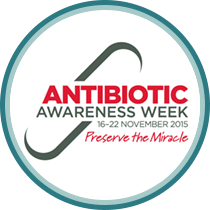Call for 'cultural shift' on antibiotic use
NPS MedicineWise has used Antibiotic Awareness Week (16-22 November) to call for a ‘cultural shift’ in the way antibiotics are used in Australia to combat the serious health issue of antibiotic resistance against a backdrop of virtually no development of new antibiotics.
“Antibiotics are one of the most important medical advances of the last century, and have transformed medical practice to enable complex surgery like transplants and treatment of life-threatening bacterial infections,” says Dr Weekes.
“We have an uneasy situation in Australia where we are consuming antibiotics at rates well above the OECD average, reported resistance to antibiotics is increasing, and there are virtually no new antibiotics in the drug development pipeline. This is particularly concerning when you consider there have been so few antibiotics that work in a novel way discovered and developed for use in humans in the past four decades.”
Overuse and misuse of antibiotics are both factors that are likely to be contributing to the decreasing amount of time it takes for bacteria to adapt to new drugs. Any exposure to an antibiotic gives bacteria the opportunity to become resistant, as does taking antibiotics when they are not needed or not using them as prescribed. The more antibiotics are used or not taken correctly, the more likely it is that bacteria will change and become resistant. When this happens, antibiotics that previously would have killed the bacteria, or stopped them from multiplying, no longer work.
The situation is so dire that the IMB Centre for Superbug Solutions at The University of Queensland has launched the Community for Open Antimicrobial Drug Discovery (CO-ADD) to discover new drugs to treat infection. CO-ADD Director Professor Matt Cooper says that without new antibiotics we may not have modern medicine in the future—and that we’re dangerously close to heading back to a pre-antibiotic era, when even simple infections caused death.
CO-ADD researchers aim to find a new class of antibiotics by screening compounds submitted by academics around the world for free, hoping to identify those compounds that work against bacteria.
“Researchers have found all of the ‘low-hanging fruit’ antibiotics from nature, isolated from soil or plants. We are now forced to look further afield for new, promising compounds,” Professor Cooper says.
“Academics across the world make millions of compounds each year, yet most of these are not designed as antibiotic drugs. We do not know where the next antibiotic will be found, but by screening a diverse range of compounds, we may just find the next antibiotic sitting on someone’s shelf.”
Dr Weekes says that while it is promising that researchers are dedicated to finding the next class of antibiotics, it is crucial that everyone takes individual responsibility to ensure our existing antibiotics continue to work for as long as possible.
“Some doctors don’t believe their individual prescribing makes a difference, and some patients believe antibiotic resistance is an issue for future generations, but the reality is that antibiotic resistance is already impacting individuals and is a growing problem in our community,” she says. “We all need to take personal action to preserve antibiotics. What we do as individuals can have a very real impact.”
NPS MedicineWise is urging people to take the following pledge to reduce antibiotic resistance:
1. I will not ask for antibiotics for colds and the flu as they have no effect on viruses
2. I understand that antibiotics will not help me recover faster from a viral infection
3. I will only take antibiotics in the way they have been prescribed
4. I understand that it is possible to pass on antibiotic resistant bacteria to others
5. I will make a greater effort to prevent the spread of germs by practising good hygiene
.
To take the pledge to fight antibiotic resistance, go to www.nps.org.au/jointhefight.
To find out more about Antibiotic Awareness Week go to www.nps.org.au/aaw


